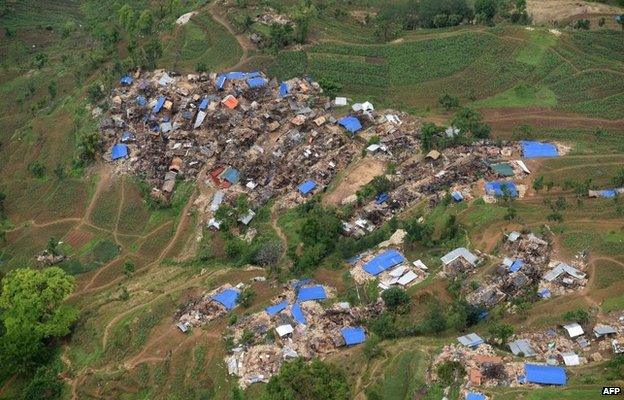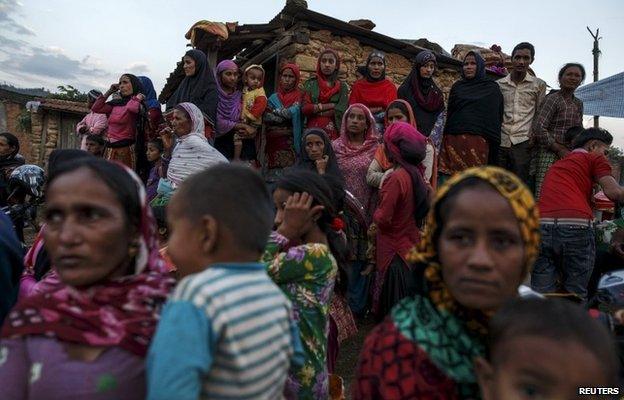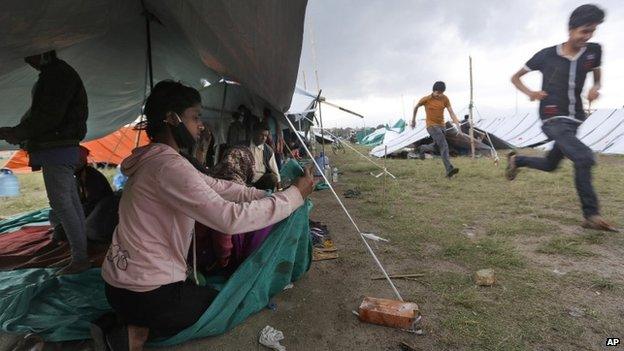Nepal earthquake: Why some believe they are lucky
- Published
The BBC's Justin Rowlatt travels towards the epicentre of the earthquake
Yesterday I was given an extraordinarily poignant video.
It was recorded less than two weeks before the first great earthquake struck and shows Nepali New Year celebrations in Barpak, a Himalayan hill town to the north-west of Kathmandu.
There is traditional dancing for the adults, the younger people enjoy a huge open air disco.
There is cheering and shouting, images of happy faces.
Barpak has now been reduced to rubble. It was right at the epicentre of the earthquake that hit Nepal.
And it remains completely cut off.

All that is left of Barpak is rubble
Ten miles from Barpak and the road ends, the only way into the village is to hike.
Yet a constant stream of helicopters have been ferrying out the injured, bringing food and shelter to the survivors.
Terrible devastation
You will read many reports of the shortcomings of the aid effort but most of what I have seen has been positive.
Two days after the quake hit I was flown by the Indian air force into one of the worst-hit and most remote Himalayan settlements. Tato Pani, to the far north of Kathmandu, is more than 100km (62 miles) from Barpak and right on the border with China.
They evacuated people with some appalling injuries. One elderly man whose legs were hideously cut and grazed, was brought in a wheelbarrow.
Another man sat in silence staring at the floor as we flew to the military hospital in Kathmandu. He had a blood soaked bandage on his head and trickle of blood from his nose.
There is terrible devastation here, hillsides where every house has been levelled.
One woman told us that there were still dead people in the wreckage of some of the homes.

Many quake victims in Gorkha are still waiting for relief
But Tato Pani, like Barpak, is cut off from the road. How could rescuers be expected to get heavy digging equipment in here?
The important thing is that no-one we spoke to had to go hungry.
That is a huge achievement.
Nepal is a mountain nation and access to remote areas is very difficult.
They may not yet have cleared the road all the way to Barpak but when I drove up there yesterday the huge landslide that had closed the valley had already been cleared. We passed diggers working to level other parts of the road.
In Gorkha, the regional capital, we were shown a warehouse stacked with food. Trucks and tractors were being loaded to take the food out to the villages.
Virtually all the houses at the epicentre of the earthquake, in Gorkha, have been flattened as Justin Rowlatt reports
One local government official told us that there were about 30 small communities they still hadn't managed to reach, there may well be more.
Some communities in the region where the quake hit say the official aid effort has passed them by, the only relief they have received has been from charities.
And, because there has been so much destruction, many people are now completely dependent on hand-outs.
But the most consistent complaint isn't about food, it is about shelter. The rainy season has started and nights are cold and grim.
Inevitable
The Nepalese government says it has procured thousands of tents and tens of thousands of tarpaulins but clearly it is not enough.
Even if their homes haven't been destroyed, many people choose to sleep out for fear another quake will bring down their already damaged homes.
That's why you see vast tent cities.

Thousands of quake victims are now living in tent cities
But, despite the horror and hardship, what has surprised me most is that many Nepalese people I've spoken to say they believe they have been lucky.
They've grown up knowing that a big quake was inevitable.
Seismologists say the pressure has been building in the tectonic fault that runs across this country for almost a century.
The week before the tragedy struck earthquake experts at a conference in Kathmandu were discussing scenarios in which hundreds of thousands of people died.
But the quake struck in daytime on a Saturday.
Schools were closed, many people were not in their homes.
And Nepal's shoddy buildings stood up to the tremors better than anyone expected.
But as I wrote this, another aftershock rocked the hotel I'm staying in. The guests poured out into the cold mountain air.
This tragedy is far from over. The work of rescue and recovery continues.
The people of Nepal may believe they have been lucky, but fear remains.
They cannot know is whether this was the big one they'd dreaded - or is another great earthquake on the way?